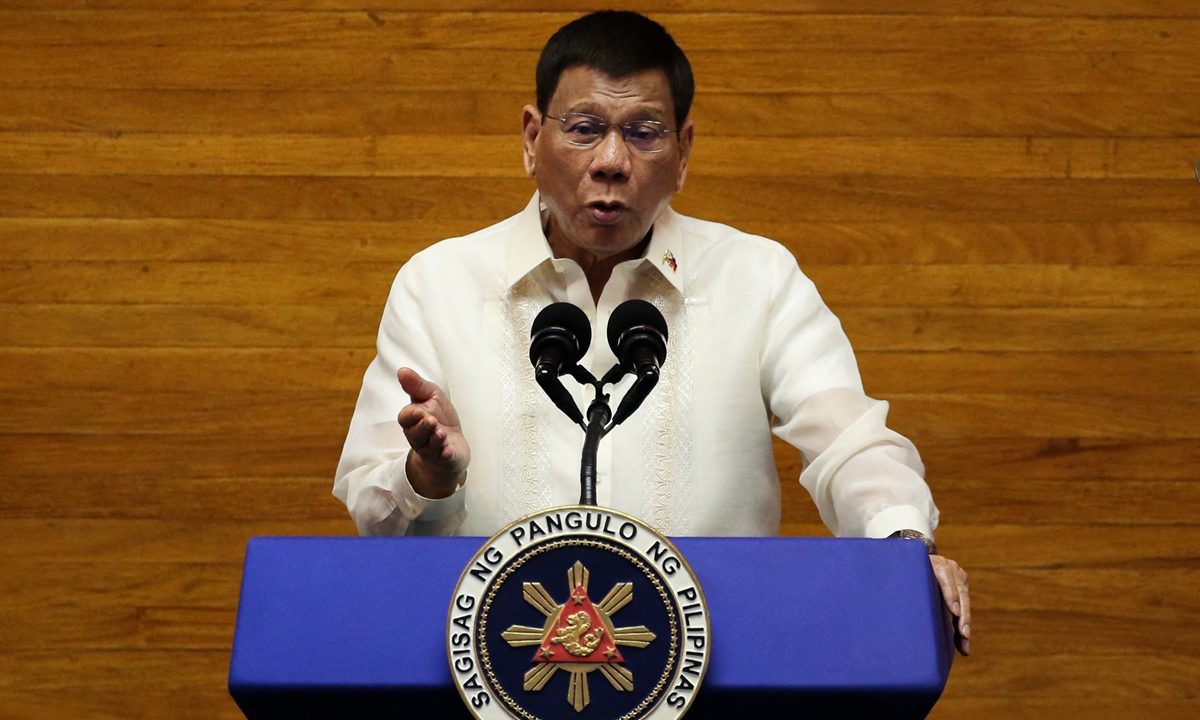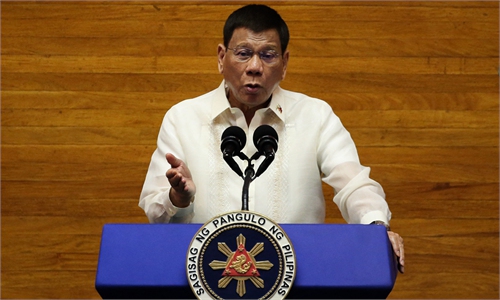
Philippine President Rodrigo Duterte speaks during the annual state of the nation address at the House of Representatives in Manila in August. Photo: AFP
Philippine President Rodrigo Duterte's long-time aide Christopher Go on Wednesday reiterated that he is not interested in running in the 2022 Philippine presidential election despite getting his party's nomination on Wednesday, but Chinese experts remain confident that bilateral ties would maintain "pragmatic and moderate" no matter who gets elected, as the route serves the best interests of the Philippines.
Senator Go was officially nominated as 2022 presidential candidate of Duterte's PDP-Laban at the party's national convention on Wednesday. Duterte, who is prevented by the constitution from running for a second six-year presidential term, was also nominated to run for vice president in 2022.
Senator Panfilo Lacson on Wednesday became the first to declare his candidacy.
Go, who is not a front-runner in public opinion polls, announced in August that he is "not interested" in running for president, and reiterated that he hopes PDP-Laban will continue to "respect my decision," local media reported.
Given the improvement and development in China-Philippines relations during the Duterte administration, some have expressed concerns that the Duterte route may not continue beyond 2022. But experts say the Philippine leader's China policy in the post-Duterte era will continue to be pragmatic and moderate.
So far, Philippine presidential contenders with military and police connections, who are part of the late president Benigno Aquino III's clique and who are backed by the US, are polling poorly, Chen Xiangmiao, an assistant research fellow at the National Institute for South China Sea Studies, told the Global Times on Wednesday.
President Duterte's daughter Sara Duterte, who is also the Mayor of Davao City, is leading public opinion polls along with Manila Mayor Isko Moreno, despite the two having yet to announce their candidacies.
"Sara, who has strong support among women, will inherit her father's political legacy… Moreno does not have a deep political family background, but his leadership is pro-people and pragmatic," Chen said.
No matter who takes office, priorities will surely be to restore the economy and enhance public health and security, which needs China's support, Chen said.
"If the new leader goes too far toward the US, there could be a huge loss of investment from China, something the Philippines cannot afford at the moment," Chen said.
If the Duterte faction comes to power, there will be no major adjustments in the Philippines' policies toward China and the US. Leaders of non-Duterte factions are also likely to adopt a more stable and moderate policy, rather than provoking new conflicts with China, analysts said.
However, experts said issues related to the South China Sea, including fishing, law enforcement, oil and gas development, may be raised a little bit more.
"After the turbulent period from 2012 to 2016, China-Philippine relations have entered a mature stage. The two countries are in a state of both conflict and cooperation, but the conflict is controllable and cooperation is gradually increasing," Chen said.
The post-Duterte era is likely to continue this maturity, because it may be the only option that serves the best interests of the Philippines, Chen said.


